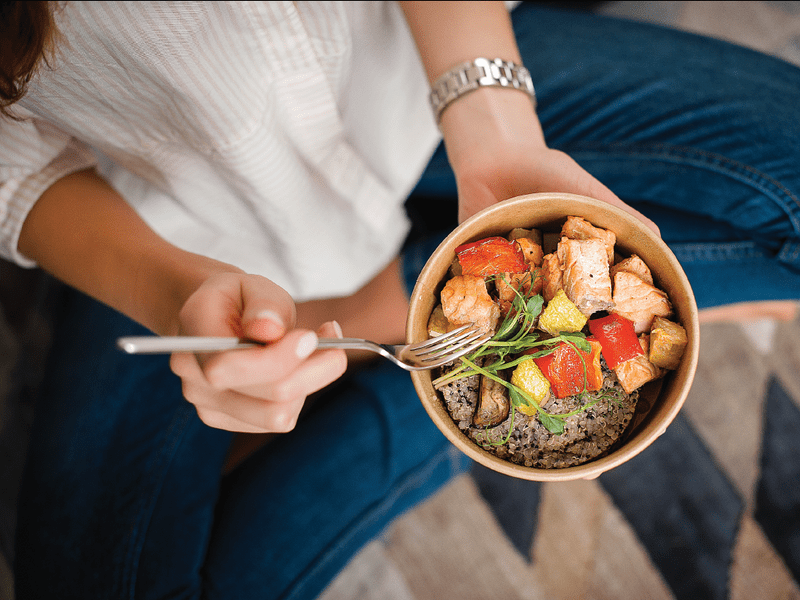“Let food be thy medicine and medicine be thy food.”
We live in a microwave mindset culture. From our food to our digital lifestyle, everything is fast with instant gratification. It’s so instant that there ends up being no gratification—no nutrients, no fulfillment. Zapped empty. When was the last time we sat with our food for more than 20 minutes while offering it passion, gratitude, sensuality, and savoring each morsel at the recommended 32 chews per bite?
Probably not often enough. We are taught that food is delicious, but our systems are designed to force feed us like they do our cattle—feed us processed feces and bacteria, like they do our pigs and chickens, and give us beautiful red ripe produce while, “strawberries and leafy greens contain the most pesticides of any produce, even after washing them.”
What we see—this plump peach—is not what we get on an array of levels, as it’s designed to confuse the consumer. How do we speak up and sit down for our health?
Our schools allow our children less than 25 minutes to eat lunch. By the time students get down to the cafeteria, wait in line and are handed cardboard crap, it’s under 15 minutes. How do our corporations treat meal time? Does this “shoveling food” practice by day impact one’s dinner habits, and life habits? Many are still standing in the kitchen, eating in for the race of consumption. Studies show that Americans are spending less time eating than they did a decade ago and for those who live alone, this number increases. How does this impact our physiological and psychological health?
These habits can lead to decreased satisfaction not only in food but in relationship to self, others and in one’s overall quality of life. Standing while eating signals stress centers in the mind, triggering a psychological response that could lead to a thought pattern where one can’t take time for pleasurable moments and basic human needs. The question then becomes, “If I can’t experience pleasure in the most basic of human ways, then how can I experience pleasure and passion in others?”
Mindfulness and every spiritual and religious practice teaches us that what we do in one area affects all. Plato summarized this idea well when he said, “The part can never be well, unless the whole is well.” Biblically speaking, “What a man thinks so he is.” So if we are addressing our biological needs in this state, is pleasure even possible? It’s contradictory. Rushing is not enjoyable. Our body tells us stress increases cortisol, decreasing the production of major hormones and shutting down some pleasurable receptors. With a nervous system operating in fight-or-flight, satisfaction centers are microwave fried.
The area we must first practice mindfulness is in our food. Food is an introduction and the most basic yet profound way to cultivate mindfulness. Increasing connection to the hands that created it, cultivated and nurtured it, provides an army of positive signals that fire off in the body and mind. Dr. Emoto, a Japanese scientist who tested how our thoughts and words impact water and the food we eat, taught us that regardless of the “cleanliness” of our consumption, this focused specific gratitude and love is critical for the health of whatever we ingest, in the dance of our bodies.
The numbers for mental health issues are increasing in our state and country. Society is skillfully designed to keep us at a short attention span, to embody feelings of shame, dysmorphia and not being enough. The most powerful decision we could make that will find its marriage to mindfulness and a spiritual practice, is deciding to commit to loving yourself through food. By taking the time our body deserves and the mind needs to connect to its pleasure, will ultimately increase pleasure in every area imaginable.
An easy way to start is by reflecting on which meal you rush through the most. If it’s lunch and there is no additional time, bring a smoothie, and speak words of loving kindness while you make it and eat it. Put on your favorite song in the background, like a mother would put headphones to belly for her unborn baby to hear. If it’s dinner, start with a colorful plate. Increase the textures and colorful diversity of the foods you eat, offering it thanks for the packed nutrients with each bite. Breakfast could be used as a time to fast and connect with a higher source.
Choosing a life of pleasure is choosing a life that encourages you to feel alive. This starts with a practice of gratitude and extends to your plate. Choose to awaken all your senses by having a sacred experience with them. This is the gateway to harmony, and will in turn meet all our needs.




